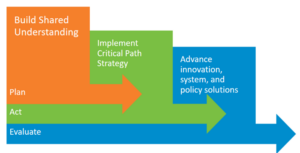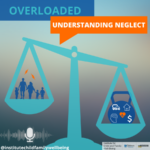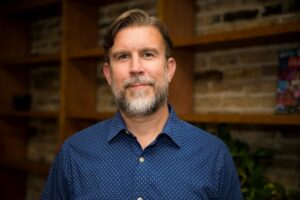The mission of the Institute for Child and Family Well-Being is to improve the lives of children and families with complex challenges by implementing effective programs, conducting cutting-edge research, engaging communities, and promoting systems change.
The Institute for Child and Family Well-Being is a collaboration between Children’s Wisconsin and the Helen Bader School of Social Welfare at the University of Wisconsin-Milwaukee. The shared values and strengths of this academic-community partnership are reflected in the Institute’s three core service areas: Program Design and Implementation, Research and Evaluation, and Community Engagement and Systems Change.
In This Issue:
- ICFW Gratitude
- Program Design and Implementation
- Research and Evaluation
- Community Engagement and Systems Change
- Recent and Upcoming Events
Grateful for Community
As we begin celebrating the holiday season this week, we would like to express our gratitude to you for being a part of our journey. Over the past six years, we have built relationships with so many passionate individuals and organizations that are committed to improving the lives of children and families who face complex challenges. We believe that through these relationships, at an individual, organizational, community, and systems-level, we can aspire to and inspire changes that lead to child and family well-being and prosperity.
During this year alone, we have celebrated the final year of our Trauma and Recovery Project, which trained hundreds of therapists and served hundreds of children and families with evidence-based, trauma-focused therapies. We launched our Strong Families, Thriving Children, Connected Communities initiative that aspires to reduce family separations for reasons of neglect by building a collaborative community. Through that initiative, we have hosted a half dozen roundtables with hundreds of Children’s Wisconsin colleagues and Community and Lived Experience partners, and released our first podcast series, Overloaded: Understanding Neglect, by highlighting the voices and expertise of those that have worked tirelessly by our sides over these past six years.
We are deeply grateful for you and your partnership, and look forward to what will come in the years to come. We wish you a holiday season full of community, happiness and hope.
Program Design and Implementation
The Institute develops, implements and disseminates validated prevention and intervention strategies that are accessible in real-world settings.
Building Brains with CARE Community of Practice
Throughout the summer, we were finally able to conduct our Building Brains with CARE Community of Practice with Newcap. In response to the challenges presented by COVID, it was a truly multimedia learning experience. The group was larger than the initial design, but Newcap staff in the Fox Valley area and ICFW Clinician Meghan Christian just completed a six-session virtual Community of Practice that followed an initial in-person session back in April 2022. This format celebrates learning and gaining mastery in concepts and new skills.
ICFW clinicians and participants used Zoom to virtually engage with each other over the past four months to revisit and complement in-person information. In the Community of Practice, skill-building time was cultivated based on different interests, findings and sharing by the participants. Identification of common trauma reactions and skills they can use within their relationships that support resilience and healthy communication were practiced. Family consultations and resource networking also occurred.
As with all efforts from ICFW, evaluation and iteration are continuous. As indicated in the exasperated opening to this article, change is also continuous. In the next iteration of Building Brains with CARE it is being used as a base for two new ICFW community education and engagement efforts, Building Brains with Community and Building Brains with Relationships. Upcoming dates for those to follow.
If you are interested in our workshops, please visit our website and check out our Training page or contact Meghan Christian at mchristian@childrenswi.org.
Research and Evaluation
The Institute accelerates the process of translating knowledge into direct practices, programs and policies that promote health and well-being, and provides analytic, data management and grant-writing support.
Recent ICFW Publications
Marcus, L. Topitzes, J., Pathak, D.R., Cho, Y., Hirko, K., Houang, R., Kwarteng, J., Hamilton, A.S., & Velie, E.M. Association of childhood socioeconomic position and race with adverse childhood experiences in a population-based sample of women. American Public Health Association Annual Meeting, Boston, MA, November 6th-9th, 2022.
Topitzes, J. (2022). Understanding trauma and its effects: Applications to criminal justice settings I & II. Justice Point and the Difference Principle, Milwaukee, WI (virtual), October 21st, 2022.
Topitzes, J., Ruffalo, L., Barry, C., & Potter, T. (2022). Opportunities to address trauma. Wisconsin Department of Children and Families Work 2022 Programs Conference: A world of opportunities, Elkhart Lake, WI, October 25-26, 2022.
Zhang, L., & Topitzes, J. (2022). The Association between Family Physical Environment and Child Maltreatment. Children and Youth Services Review, 106551.
Community Engagement & Systems Change
The Institute develops community-university partnerships to promote systems change that increases the accessibility of evidence-based and evidence-informed practices.
New Podcast – Overloaded: Understanding Neglect
By Luke Waldo
We are excited to announce our first podcast series, Overloaded: Understanding Neglect. Neglect is a complex and wicked problem, but it’s one that we believe is preventable if we work together to reimagine how we support families overloaded by stress. Neglect is a public health crisis, as it’s the most common reason that children are separated from their families by the government. 37% of all US children experience a CPS investigation, 13% of all children have confirmed/substantiated maltreatment, and children of color are disproportionately represented in foster care. In Wisconsin, nearly 70% of children in foster care are separated from their families due to neglect.
The Overloaded: Understanding Neglect podcast represents the important first step of building a shared understanding of the problem and will serve as a foundation for future innovations in practice, policy, and systems change. Join host Luke Waldo, Director of Program Design and Community Engagement at the Institute for Child and Family Well-being, as he explores these issues with research and policy experts Tim Grove (Wellpoint Care Network), Jennifer Jones (Prevent Child Abuse America), Bryan Samuels (Chapin Hall), and Dr. Kristi Slack (University of Wisconsin), Lived Experience expert Bregetta Wilson (Wisconsin Department of Children and Families) and five Children’s Wisconsin child welfare and child maltreatment prevention experts. Through these conversations, we developed a compelling narrative that seeks to build a shared understanding of the realities of overloaded families, so that we might find solutions that reduce family separations for reasons of neglect.
Join the conversation wherever you listen to your podcasts.
Apple Podcasts
Amazon Music
Google Podcasts
Spotify
Learn More:
For upcoming Overloaded: Understanding Neglect “Book Club” discussions, check our upcoming events and social media.
Strong Families, Thriving Children, Connected Communities Initiative
Children thrive when they have regular interactions with responsive, caring adults. Families experiencing significant stressors related to financial insecurity, housing instability, or the impact of systemic and interpersonal trauma can be overloaded with stress, interrupting those interactions. In the United States 1 in 3 of all children will experience a Child Protective Services (CPS) investigation, 1 in 10 will have confirmed or substantiated instances of maltreatment, and in Wisconsin 70% of all children in foster care were separated from their families with neglect cited as a removal reason.

We believe that neglect is preventable. The goal of the Strong Families, Thriving Children, Connected Communities (SFTCCC) initiative is to reduce the number of family separations for reasons of neglect by building a community focused on collaboratively pursuing policies and practices that support overloaded families and address systemic failings. SFTCCC launched in early 2022 and is focused on building a shared understanding of the root causes of neglect to better identify critical pathways towards prevention.
Critical Pathways are specific problem/priority spaces that are focal points for elevating or designing specific and actionable system-level solutions. Through a progressive series of six roundtables so far this year, we’ve worked with staff at Children’s Wisconsin, community members, and people with lived experience to identify systemic challenges, risk factors, and barriers to supporting families overloaded by stress.
In the next roundtable on December 7th, we invite anyone interested to learn more about the themes we’ve discovered so far, as we look to cultivate a deeper understanding of how issues like poverty, systemic racism, social isolation, and other issues lead overloaded families to child welfare involvement. In early February 2023 we’ll be hosting a virtual data walk to look at how these specific themes overlap with evidence from research and other data sources. Even if you haven’t been to any SFTCCC events before, we welcome all new interested parties to participate!
Quick links:
Register for the SFTCCC Community Roundtable here.
Complete the SFTCCC Survey here.
If you are interested in learning more, participating in a Roundtable, and/or joining this initiative, please visit the SFTCCC project page or sign up here.
Recent and Upcoming Events
The Institute provides training, consultation and technical assistance to help human service agencies implement and replicate best practices. If you are interested in training or technical assistance, please complete our speaker request form.
Listen or Register Now
- ICFW Podcast – Overloaded: Understanding Neglect – September Release
- SFTCCC Community Roundtable – December 7th
- Parent-Child Interaction Therapy Therapist Training – February and March 2023
Archived Recent Events
- Translational Design: An Introduction – August 3rd
- Innovation in Prevention Webinar Series – August, September and November
- SFTCCC Community Roundtable – October 12th
- Building Brains with Community – October 26th



